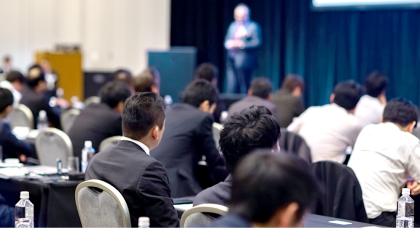President’s Corner
The Power of Industry-Academia Collaboration in Chemical
Engineering:
“Co‑creation”, “Co‑performance” and “Competitiveness”

President of The Society of Chemical Engineers, Japan
It brings me great joy and a deep sense of responsibility to be entrusted with the prestigious role of President of the Society of Chemical Engineers, Japan (hereinafter “SCEJ”) for 2025.
I currently serve as Chairman of Toyo Engineering Corporation, and affirm that chemical engineering
plays a
central role in plant engineering.
This is because chemical engineering plays a vital role in a wide range of areas such as process development
and design, equipment design, simulation, and troubleshooting. Likewise, in plant engineering—which requires
knowledge from various disciplines that include mechanical, electrical, and civil engineering—chemical
engineering
plays a central role in collaborating with these fields to drive process development, plant design,
construction,
and operational support. These activities are integral to enhancing client competitiveness by contributing to
corporate mandates, namely improving product quality optimization, cost reduction, environmental impact
minimization, and new product development.
Chemistry is widely known as a natural science that studies the properties and changes of substances. It
rigorously
investigates the structures and reactions of substances at atomic and molecular levels, synthesizes new
substances,
and elucidates their characteristics.
Conversely, chemical engineering is an academic discipline that utilizes chemical knowledge to develop
technologies for the efficient industrial production of valuable substances, with particular emphasis on
practical
application, such as the design of equipment for large-scale chemical reactions, process control, and energy
efficiency.
Chemical engineering cannot exist without fundamental chemistry, and chemistry relies on chemical engineering to
translate discovery into practical use that benefits the world, making both academic fields vital to modern
society
and their mutual advancement essential.
While expectations for the SCEJ’s role have evolved over time, from the past through the present and
continuing into the future, it has remained a significant presence in furthering the field of chemical
engineering.
During the period of Japan’s rapid economic growth, the SCEJ played a central role in human resource development
by
acting as a key link between industry and academia, thereby contributing to the development of new chemical
products
and processes and greatly contributing to the growth of the chemical industry.
Today, societal needs have shifted more toward contribution to sustainability and, amid the growing severity of
environmental issues such as global warming and resource depletion, the spotlight is shining on the SCEJ and its
contributions towards cleantech and the realization of a circular society.
Looking ahead, as greater emphasis is placed on addressing societal challenges and as human resource development
becomes increasingly crucial, expectations are being placed on the SCEJ to play an ever more central role in
championing sustainable solutions. By leveraging emerging technologies like AI and IoT to enhance chemical
processes, the SCEJ is anticipated to contribute to the maintenance and development of social infrastructure and
the
attainment of a more efficient and sustainable society.
This year, the SCEJ will spearhead one of its key initiatives by holding its Autumn Meeting in September to coincide with INCHEM TOKYO 2025, taking place in the same region. INCHEM’s unified theme for the year is “Co-creating a Sustainable Future: Toward a Sustainable / Carbon Neutral Society through Chemical Technology Innovation”. By hosting symposiums at INCHEM, the SCEJ aims to build on the theme and promote collaboration with the Autumn Meeting. It is anticipated that this will be an occasion to foster communication among students, young researchers, and industry representatives, leading to strengthened industry-academia collaboration and effective human resource development.
The SCEJ will celebrate its 100th anniversary in 2036. “VISION 2036” was announced in March 2024, and in pursuit of the mission to “Pioneering the future of society with people, science & technology,” the SCEJ is committed not only to supporting the development of the chemical industry, but also to contributing to the sustainable development of society as a whole and solving a wide range of social issues. Furthermore, I firmly believe that facilitating industry-academia collaboration in chemical engineering will foster and nurture such key “powers” as “co-creation,” “co-performance,” and “competitiveness”.
As president, I seek to lead the SCEJ towards more dynamic and proactive activities, and hope to receive your guidance and support in this endeavor.
Haruo NAGAMATSU (Full Member)
1981 Joined, Toyo Engineering Corporation
2000 Managing Director, Toyo Engineering & Construction Sdn. Bhd.
2013 Executive Officer / Deputy Unit Director of Infrastructure Business Unit / General Manager of
Infrastructure
Project Division, Infrastructure Business Unit
2016 Senior Executive Officer / Unit Director of Infrastructure Business Unit
2017 Director / Senior Executive Officer / Unit Director of Infrastructure Business Unit
2018 President & Chief Executive Officer
2023 Chairman (Present)
- SCEJ
- About
- President's Corner
- President’s Corner






